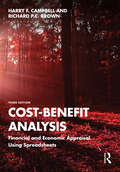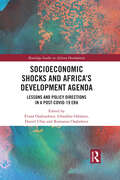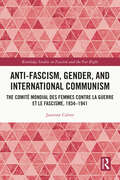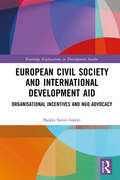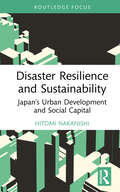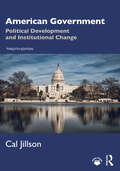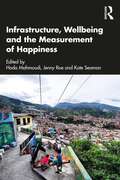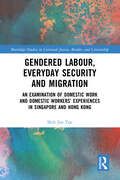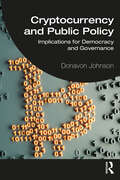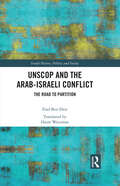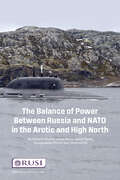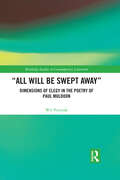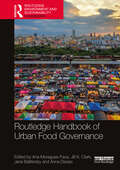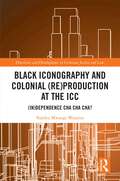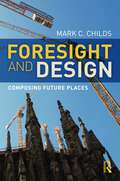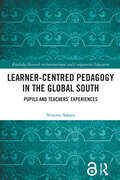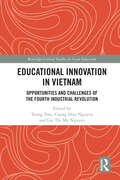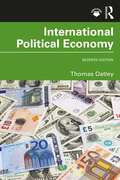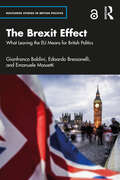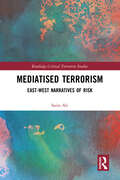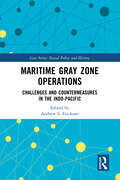- Table View
- List View
Cost-Benefit Analysis: Financial and Economic Appraisal Using Spreadsheets
by Harry F. Campbell Richard P.C. BrownNow in its third edition, Cost-Benefit Analysis has been updated, offering readers the perfect introduction to project, programme and policy appraisal using basic tools of financial and economic analysis. The key economic questions of any social cost-benefit analysis are: do the benefits of the project or policy exceed the costs, no matter how widely costs and benefits are spread, and irrespective of whether or not project impacts, such as environmental effects, are reflected in market prices? And which group or groups of individuals receive the benefits and which bear the costs? This book addresses these questions with an emphasis on putting the theory presented in the book into practice. This third edition has several attractive features: Readers are encouraged to develop their own skills by applying the tools and techniques of cost-benefit analysis to case studies and examples, including an analysis of a project which is developed throughout the book. The book emphasizes the use of spreadsheets which are invaluable in providing a framework for the cost-benefit analysis. A dedicated chapter provides guidance for writing up a report which summarises the analysis which has been undertaken. New pedagogical features, including Technical Notes and Examples, have been added as an aid to readers throughout the text. An appendix provides 14 additional case studies which can be developed in class or as assignment projects. Additional material for instructors and students is provided through Support Material maintained by Routledge. This updated edition is an ideal text for a course on cost-benefit analysis where the emphasis is on practical application of principles and equipping students to conduct appraisals. It is also a useful handbook for professionals looking for a logical framework in which to undertake their cost-benefit analysis work.
Socioeconomic Shocks and Africa’s Development Agenda: Lessons and Policy Directions in a Post-COVID-19 Era (Routledge Studies in African Development)
by Evans Osabuohien Gbadebo Odularu Daniel Ufua Romanus OsabohienThis book investigates how African countries respond to socioeconomic shocks, drawing out lessons to help to inform future policy and development efforts. The challenges posed by the COVID-19 pandemic affected all sectors of the economy, exposing substantial structural weaknesses and complexities in supply chains and logistics across the African continent. This book examines the disruptive impact of the pandemic across Africa. However, it also goes beyond the current crisis to investigate how socioeconomic pressures in general impact commodity prices, national budgeting processes, food, business, energy sectors, education, health, and sanitation. Overall, the book presents evidence-based solutions and policy recommendations to enable readers to improve resilience and responses to future crises. The insights provided by this book will be of interest to policymakers and development agencies, as well as to researchers of global development, politics, economics, business, and African studies.
Anti-Fascism, Gender, and International Communism: The Comité Mondial des Femmes contre la Guerre et le Fascisme, 1934 – 1941 (Routledge Studies in Fascism and the Far Right)
by Jasmine CalverAnti-Fascism, Gender, and International Communism provides a comprehensive history of the Comité mondial des femmes contre la guerre et le fascisme (CMF), an international women’s organisation concerned with confronting the impact of fascism on women and children across the globe. Women played an essential role in the international struggle against fascism during the interwar period, although a focus on the efforts of men and political figures by the historiography has largely overshadowed women’s interventions against right-wing dictatorships. Through an examination of the committee’s key figures, strategies, connections, and campaigns, this book offers a significant contribution to the histories of both women’s activism and anti-fascist activism by positioning the CMF as an important contributor to international political advocacy in the interwar period. Further, the group’s association with international communism and the burgeoning Popular Front movement placed the CMF at the forefront of global debates about the threat posed by fascism and imperialism. This book explores how the professional women activists and the working-class women who populated the organisation developed a committee which advocated for women on a global scale. It charts how the CMF utilised a variety of physical spaces and literary formats to co-ordinate anti-fascist actions through its expansive and ambitious campaigns. The author also demonstrates the close connections between the Communist International and the CMF as a communist front organisation, to provide context for the group’s decision-making and prioritisation of certain campaigns over others. This book will be of interest to scholars of anti-fascism, feminism, women’s history, communism, activism, internationalism, anti-imperialism, and French history.
Conspiracy Theories in the Time of Covid-19 (Conspiracy Theories)
by Clare Birchall Peter KnightConspiracy Theories in the Time of Covid-19 provides a wide-ranging analysis of the emergence and development of conspiracy theories during the Covid-19 pandemic, with a focus on the US and the UK. The book combines digital methods analysis of large datasets assembled from social media with politically and culturally contextualised close readings informed by cultural studies. In contrast to other studies which often have an alarmist take on the "infodemic," it places Covid-19 conspiracy theories in a longer historical perspective. It also argues against the tendency to view conspiracy theories as merely evidence of a fringe or pathological way of thinking. Instead, the starting assumption is that conspiracy theories, including Covid-19 conspiracy theories, often reflect genuine and legitimate concerns, even if their factual claims are wide of the mark. The authors examine the nature and origins of the conspiracy theories that have emerged; the identity and rationale of those drawn to Covid-19 conspiracism; how these conspiracy theories fit within the wider political, economic and technological landscape of the online information environment; and proposed interventions from social media platforms and regulatory agencies. This book will appeal to anyone interested in conspiracy theories, misinformation, culture wars, social media, and contemporary society.
Democratic Governance in Taiwan (Routledge Studies on Comparative Asian Politics)
by John Fuh-sheng Hsieh Robert Henry CoxThis book employs a policy-based approach to examine the emerging governance structure in Taiwan, one of several countries in East Asia where democratic consolidation is firmly established. Each chapter provides a detailed investigation of reforms that have helped to strengthen Taiwan’s democracy in such areas as elections, civil service recruitment, economic policy, social policy, environmental protection, civil rights, response to the COVID-19 pandemic, civil–military relations, and foreign and mainland China policy. As a study of Taiwan’s democratic governance, this book will be of interest to students and scholars of Asian politics, comparative politics, democracy, and Taiwan.
COVID-19, the LGBTQIA+ Community, and Public Policy
by Wallace SwanThe COVID-19 pandemic has exposed and exacerbated long-standing inequities, both in the United States and throughout the world. As studies emerge to help us understand the effects of the COVID-19 pandemic on every facet of modern life, it is critical that the effect of the pandemic on the Lesbian, Gay, Bisexual, Transgender, Queer, Intersexual, and Asexual (LGBTQIA+) communities not be overlooked. While some pioneering studies analyzing the impacts of the pandemic upon LGBTQIA+ communities have been conducted, and some efforts are being made to collect data which can impact the development of policy, reliable data resources are limited to a few enterprising states, and this data has not been systematically shared with public policy-makers or with the public to date. COVID-19, the LGBTQIA+ Community, and Public Policy explores precisely how the pandemic has affected these communities and what concrete steps need to be taken to ameliorate its effects. As the chapters in this book demonstrate, the unusual nature of the pandemic has significantly impacted state and local LGBTQIA+ infrastructure, leading to closure of some institutions and reductions in functioning for many others. The contributors examine the ways the pandemic has highlighted preexisting challenges on accessing adequate healthcare (including mental healthcare and substance abuse treatment), employment, education, secure housing, and other societal resources. Together, these chapters present a state-of-the-field overview of health disparities in the LGBTQIA+ community, and demonstrate the particular need for serious, timely, public policy interventions.
European Civil Society and International Development Aid: Organisational Incentives and NGO Advocacy (Routledge Explorations in Development Studies)
by Balázs Szent-IványiThis book explains how and why European non-governmental development organisations (NGDOs) engage in advocacy towards the European Union (EU). It analyses the heterogenous structure of the sector, with examples ranging from large multinational networks to essentially single person NGDOs. The book provides a detailed map of the topics which have featured in NGDO advocacy since 2006, arguing that NGDOs have generally been reactive in their advocacy towards the EU. The author explains how they have contested a number of policy issues on the agendas of the EU institutions, especially around the diversion of aid to manage migration and leverage private sector investments. Furthermore, some NGDOs have used the COVID-19 pandemic as an opportunity to re-package their pre-existing policy demands. Based on an analytical framework focused around three variables, namely moral vision, funding concerns, and the need to build/maintain a ‘good’ reputation, the book explains these advocacy choices, and argues that much of NGDO advocacy seems to be consistent with funding motivations. The author highlights the importance of moral vision and reputational concerns in moderating how far NGDOs will go with funding-driven advocacy, arguing that motivations need to be looked at in their complexity, and within the specific policy context. Drawing on a range of quantitative and qualitative data sets to provide a rich and varied picture of the advocacy work of European development NGOs, European Civil Society and International Development Aid is a key reference for researchers and practitioners working in the field.
Disaster Resilience and Sustainability: Japan’s Urban Development and Social Capital (Routledge Research in Sustainable Planning and Development in Asia)
by Hitomi NakanishiThis book examines urban planning and infrastructure development in Japanese cities after the second world war as a way to mitigate the risks of disasters while pursuing sustainable development. It looks at the benefits of social capital and how communities organise to tackle problems during the recovery phase after a disaster. The book also illustrates with case studies to highlight community attitudes which improve recovery outcomes. The book underlines challenges such as ageing and depopulation which Japan would face should the next disaster occur. These demographic shifts are causing difficulties among neighbourhood associations at a time when communities need to effectively support each other. Nakanishi explains why overcoming these societal issues is imperative for sustainability and the need for a comprehensive approach which would integrate smart technology. This book will be of interest to scholars in city development and planning, urban studies and human geography, as well as those interested in building resilient communities.
American Government: Political Development and Institutional Change
by Cal JillsonHow politics in America works today, how it got that way, and how it’s likely to change through reform—these are the themes that pervade every chapter of Cal Jillson’s highly lauded American Government: Political Development and Institutional Change. Even in the midst of current challenges, America’s past is present in all aspects of the contemporary political system. Jillson uses political development and the dynamics of change as a thematic tool to help students understand how politics works now—and how institutions, participation, and policies have evolved over time to produce the contemporary political environment. In addition, Jillson helps students think critically about how American democracy might evolve further, focusing in every chapter on reform and further change. New to the 12th Edition: Assesses the characteristics and results of the Trump administration and the policy and tonal changes of the early Biden adminstration. Describes numerous ways in which the American political system has been affected by the Covid-19 pandemic Assesses the implications of the January 6, 2021 attack on the Capitol and what it implies for our political culture and partisan politics. Assesses the implication of "fake news" and "the move to mobile" for our politics. Explores the evidence for increasing polarization in public opinion, voting behavior, and the work of Congress and the courts.. Details the impact that the Russian invasion of Ukraine had on President Biden’s attempt to rebuild U.S. national security alliances.
Infrastructure, Wellbeing and the Measurement of Happiness
by Roe Jenny Seaman Kate Mahmoudi HodaThis book takes an interdisciplinary approach to our understanding of infrastructure, and it’s influence on happiness and wellbeing, by examining the concept from economic, human development, architectural, urban planning, psychological, and ethical points of view. Providing insights from both research and practice the volume discusses how to develop happier cities and improve urban infrastructure for the wellbeing of the whole population. The book puts forth the argument that it is only in understanding the true nature of infrastructure’s reach – how it connects, supports, and enlivens human beings – that we can truly begin to understand infrastructure’s possibilities. It connects infrastructure to that most elusive of human qualities – happiness – examining the way infrastructure is fundamentally tied to human values and human well-being. The book seeks to suggest novel approaches, identify outmoded undertakings, and define new possibilities in order to maximize infrastructure’s impact for all people – with a focus on diversity, inclusion and equity. In seeking to define infrastructure broadly and examine its possibilities systematically this book brings together theory and evidence from multiple disciplinary perspectives including, sociology, urban studies, architecture, economics, and public health in order to advance a startling claim – that our lives, and the lives of others, can be substantively improved by greater adhesion to the principles and practices of infrastructure design for happiness and wellbeing.
Gendered Labour, Everyday Security and Migration: An Examination of Domestic Work and Domestic Workers’ Experiences in Singapore and Hong Kong (Routledge Studies in Criminal Justice, Borders and Citizenship)
by Shih Joo TanDrawing on original empirical research from Singapore and Hong Kong, Gendered Labour, Everyday Security and Migration interrogates women migrant domestic workers’ experiences of work and workplace exploitation. It examines the ways in which these women negotiate everyday security and safe work against the backdrop of affective employment relations and institutional structures of labour and migration law. It challenges the current emphasis on the language of exploitation and legal approaches to identifying, understanding and rectifying poor employment conditions for women migrant domestic workers. This book addresses the limited research literature that examines the extent to which regulatory or criminal justice responses are relevant to, and utilised by, women migrant domestic workers in their everyday negotiation of safe work and offers a unique contribution to the field. An accessible and compelling read, it will be of interest to researchers from across the fields of criminology, sociology, labour migration studies and women’s studies.
Cryptocurrency and Public Policy: Implications for Democracy and Governance
by Donavon JohnsonProponents of cryptocurrency have argued it has the potential to drive economic prosperity and to help reimagine social benefits in many spaces across the world. However, as the knowledge and use of cryptocurrency increases, so do questions about trust, identity, privacy, and security. This new book connects the literature on public policy and cryptocurrency, asking: What are the governance and democracy implications of the rise in cryptocurrency use? Beginning with a conceptual overview of cryptocurrency and how governmental actions (or inaction) led to its creation, author Donovan Johnson argues that symbiotic relationships can and do exist among cryptocurrency, democracy, and governance in the public policy/administration domain. Principles such as equity and inclusion, efficiency and effectiveness, accountability, and quality of life are explored as conduits through which cryptocurrency interfaces with public policy, democracy, and good governance. This informative and insightful book covers a range of public policy and public administration issues, offering readers an understanding of how cryptocurrency intersects with democracy, governance, fiscal and monetary policies, economic growth, corruption, and privacy. Cryptocurrency and Public Policy will be of interest to students and scholars of public policy and administration, finance, economics, and business.
The Effects of Rebel Parties on Governance, Democracy and Stability after Civil Wars: From Guns to Governing (Democratization and Autocratization Studies)
by John Ishiyama Gyda M. SindreThis book provides a systematic overview and in-depth analysis of the effects of rebel group inclusion on democracy following the end of conflict across the globe. It examines different types of rebel groups, addressing the subject matter through the lens of three dimensions – democracy, stability and governance – which structure the book and the individual chapters. As such, it affords a rare opportunity to bring together two heretofore separate research traditions – conflict studies and political parties. This book will be of key interest to scholars and students of political parties and party theory, civil wars and peacebuilding, democratization studies and state building and more broadly to comparative politics, development studies, and security studies.
UNSCOP and the Arab-Israeli Conflict: The Road to Partition (Israeli History, Politics and Society)
by Elad Ben-DrorThis book provides the first comprehensive account of the work of the United Nations Special Committee on Palestine (UNSCOP), constituted by the United Nations General Assembly in 1947 to study the situation in Palestine at the end of the British Mandate and make recommendations about its political future. Utilizing a wealth of archival documentation, some of it never before studied, Elad Ben-Dror explores the various aspects of UNSCOP’s activity to understand how they came to determine the fate of the country’s inhabitants. The book analyses the methods and motivations of the various members, with special attention given to the personal viewpoint of each member of the committee. Through this Ben-Dror shows that the partition recommendation emerged after a long process of study, debate, and compromise that was very much dependent on the characters and circumstances of the individual members of the committee. UNSCOP and the Arab-Israeli Conflict will be a key text in understanding the role of UNSCOP in shaping the modern Middle East. It will be appropriate for scholars and students of political science, Palestine and Israeli history, the Arab-Israeli conflict, the UN and diplomacy, and conflict resolution.
The Balance of Power Between Russia and NATO in the Arctic and High North
by Sidharth Kausha James Byrne Joseph Byrne Giangiuseppe Pilli Gary SomervilleThe resurgence of Russian power in the Arctic and High North will be a key consideration for NATO planners. The Alliance’s northern flank represents both a potential vulnerability due to its relative isolation and an area in which NATO enjoys options for horizontal escalation in a conflict. Moreover, as the effects of climate change create opportunities for both navigation and resource extraction, peacetime control over the Northern Sea Route (NSR) and a contest to establish effective administrative control in this area are likely. Disagreements regarding the degree of Russia’s jurisdiction over the NSR could, for example, simmer into a form of sub-threshold competition. The purpose of this Whitehall Paper will be to examine the balance of power between NATO and Russia in this critical region in order to establish the level of ambition that the capabilities being developed by Russia can support.
“All Will Be Swept Away”: Dimensions of Elegy in the Poetry of Paul Muldoon (Routledge Studies in Contemporary Literature)
by Wit PietrzakThe book offers the first comprehensive study of Paul Muldoon’s mourning verse. Considering not only the celebrated elegies like "Yarrow," "Incantata" or "Sillyhow Stride" but also the elegiac impulse as it develops throughout Muldoon’s entire work, All Will Be Swept Away charts a large swathe of Muldoon’s poetic landscape in order to show the complexity with which he approaches the themes of death and mourning. Using archival material as well as a vast array of theoretical apparatuses, the book unveils the psychological, literary and political undertones in his poetry, all the while attending to the operations of the poetic text: its form, its music and its capacity to console, warn and censure.
Routledge Handbook of Urban Food Governance (Routledge Environment and Sustainability Handbooks)
by Ana Moragues-Faus Jill K. Clark Jane Battersby Anna DaviesThe Routledge Handbook of Urban Food Governance is the first collection to reflect on and compile the currently dispersed histories, concepts and practices involved in the increasingly popular field of urban food governance. Unpacking the power of urban food governance and its capacity to affect lives through the transformation of cities and the global food system, the Handbook is structured into five parts. The first part focuses on histories of urban food governance to trace the historical roots of current dynamics and provide an impetus for the critical lens on urban food governance threaded through the Handbook. The second part presents a broad overview of the different frames, theories and concepts that have informed urban food governance scholarship. Drawing on the previous parts, part three engages with the practice of urban food governance by analysing plans, policies and programmes implemented in different contexts. Part four presents current knowledge on how urban food governance involves different agencies that operate across scales and sectors. The final part asks key figures in this field what the future holds for urban food governance in the midst of pressing societal and environmental challenges. Containing chapters written by emerging and established scholars, as well as practitioners, the Handbook provides a state of the art, global and diverse examination of the role of cities in delivering sustainable and secure food outcomes, as well as providing refreshed theoretical and practical tools to understand and transform urban food governance to enact more sustainable and just futures. The Routledge Handbook of Urban Food Governance will be essential reading for students, scholars, practitioners and policymakers interested in food governance, urban studies, sustainable food and agriculture, and sustainable living more broadly.
Black Iconography and Colonial (re)production at the ICC: (In)dependence Cha Cha Cha?
by Stanley Mwangi WanjiruThis book explores the reproduction of colonialism at the International Criminal Court (ICC), and examines International criminal law (ICL) vs the Black body through an immersive format of Art, Music, Poetry, and Architecture and post-colonial/critical race theory lens. Taking a multi-disciplinary approach, the book interrogates the operationalization of the Rome statute to detail a Eurocentric hegemony at the core of ICL. It explores how colonialism and slavery have come to shape ICL, exposing the perpetuation of the colonial and warns that it heralds ominous contemporary and future implications for Africa. As currently envisaged and acted out at the ICC, this law is founded on deceptive and colonial ideas of ‘what is wrong’ in/with the world. The book finds that the contemporary ICL regime is founded on white supremacy that corrupts the law’s interaction with the African. The African is but a unit utilised by the global elite to exploit and extract. From time to time, these alliances disintegrate with ICL becoming a retaliatory tool of choice. What is at stake, is power, not justice. This power is hierarchical with Eurocentrism at the top throughout modern history. Colonialism is seen not to have ended but to have regerminated through the foundation of the ‘independent’ African state. The ICC reproduces the colonial by use of European law, and ultimately the over representation of the black accused. To conclude, the book provides a liberated African forum that can address conflicts in the content, with a call for the end of the ICC’s involvement in Africa. The demand is made for an African Court that utilises non-colonising African norms which are uniquely suited to address local conflicts. Multidisciplinary in nature, this book will be of great interest to students and scholars of International Criminal Law, Criminal Justice, Human Rights Law, African Studies, Global Social Justice, Sociology, Anthropology, Postcolonial Studies, and Philosophy.
Foresight and Design: Composing Future Places
by Mark C. ChildsEvery plan, pro-forma, design, building contract, and construction schedule is a proposal about future places. To help improve such proposals, Foresight and Design: Composing Future Places presents conceptual tools to inform design and outline the need for designers to rigorously think about potential futures. Our built compositions are constantly transforming due to continuing urbanization, demographic shifts, climate change, the evolution of virtual worlds, economic and health disparities, and other unforeseen trends. If we envision and plan for alternative futures, we are better able to purposefully respond. This book presents emerging practices of foresight, including signals of change, thick descriptions, pace layers, (re)framing, prototyping, scenarios, maps of change, storytelling, and world-building, to indicate how robust contemplation of multiple potential futures can help us compose places that are durable, resilient, and adaptable. Five brief case studies interspersed between the chapters serve as examples of practitioners exercising foresight through these practices. Contributions include a description of a regional design process in Afghanistan by Anthony Fettes of Sasaki Architects, and an exploration into the Indigenous Futurism model-making competition by Anjelica Gallegos. Written for architects, designers, planners, developers, city councilmembers, and engineers, this book encourages all composers of the built environment to envision alternative futures and purposefully respond.
Learner-Centred Pedagogy in the Global South: Pupils and Teachers’ Experiences (Routledge Research in International and Comparative Education)
by Nozomi SakataLearner-Centred Pedagogy in the Global South: Pupils and Teachers’ Experiences shines light on learner-centred pedagogy (LCP), which has gained popularity within global and national governments, albeit resulting in puzzling and inconsequential appropriation. Nozomi Sakata draws on award-winning research on learner centred pedagogy conducted in Tanzania that looks to shift the focus from teachers and teaching to students and learning. The recent spread of LCP through global policy discourse meets Tanzania’s historical and contemporary (in)compatibility in local schools. The book explores how pupils’ perceived classroom experiences are formed through pedagogical elements beyond the classroom. It also enquires into how observable LCP activities and/or pupils’ perceptions of classroom practices relate to their academic performance and learning attitudes. The book highlights the multidimensionality of pedagogy and the need to consider multiple viewpoints from both teachers and pupils and to consider the historical and socio-cultural contexts in any pedagogical research. This book will be of value to researchers and students interested in pedagogy, policy transfer and education reforms in the global South. The Chapters 5, 6 and 8 of this book are available for free in PDF format as Open Access from the individual product page at www.routledge.com. It has been made available under a Creative Commons Attribution-Non Commercial-No Derivatives 4.0 license.
Educational Innovation in Vietnam: Opportunities and Challenges of the Fourth Industrial Revolution (Routledge Critical Studies in Asian Education)
by Trung Tran Cuong Huu Nguyen Loc Thi My NguyenThis edited collection, one of the first to be written chiefly by Vietnamese scholars, explores innovation in Vietnamese education under the impact of the Fourth Industrial Revolution. Vietnam is considered a booming country with its continued economic rise, and the contributors explore one of Vietnam’s strategies to achieve further economic growth, which is the innovation – and modernization – of its education system. The content is split into two parts, the first focusing on innovations in educational policy and management and the second looking at innovation in teaching theories and methods. It shows the vitality and innovation coming from developing countries like Vietnam, where necessity breeds fast adoption of education technology and development. This insightful edited volume will help researchers in comparative education, educational development, and Asian studies understand the achievements and challenges of Vietnamese general education and higher education in the Fourth Industrial Revolution.
International Political Economy
by Thomas OatleyBroadly viewing the global economy as a political competition that produces winners and losers, International Political Economy holistically and accessibly introduces the field of IPE to students with limited background in political theory, history, and economics. This text surveys major interests and institutions and examines how state and non-state actors pursue wealth and power. Emphasizing fundamental economic concepts as well as the interplay between domestic and international politics, International Political Economy not only explains how the global economy works, it also encourages students to think critically about how economic policy is made in the context of globalization. New to the Seventh Edition Includes the disruptive impact of the pandemic on the global economy Includes discussion of climate change, the Green New Deal, and Green Industrial Policy Extended discussion of the impact of great power competition on the global economy and the role weaponized interdependence might play in this competition Considers the impact that Russia’s invasion of Ukraine will have on globalization Introduces full color format
The Brexit Effect: What Leaving the EU Means for British Politics
by Gianfranco Baldini Edoardo Bressanelli Emanuele MassettiThis book examines the seismic impact of Brexit on the British political system, assessing its likely long-term effect in terms of a significantly changed political and constitutional landscape. Starting with the 2015 general election and covering key developments up to "Brexit Day", it shows how Brexit "transformed" British politics. The unprecedented turmoil – two snap elections, three Prime Ministers, the biggest ever defeat for the Government in Parliament, an impressive number of rebellions and reshuffles in Cabinet and repeated requests for a second independence referendum in Scotland – as a result of leaving the EU, calls into question what sort of political system the post-Brexit UK will become. Taking Lijphart’s "Westminster model" as its reference, the book assesses the impact of Brexit along three dimensions: elections and parties; executive–legislative relationships; and the relationship between central and devolved administrations. Based on a wealth of empirical material, including original interviews with key policymakers and civil servants, it focuses on the "big picture" and analytically maps the direction of travel for the UK political system. This book will be of key interest to scholars and students of Brexit, British politics, constitutional, political, and contemporary history, elections and political parties, executive politics, and territorial politics as well as more broadly related practitioners and journalists.
Mediatised Terrorism: East-West Narratives of Risk (Routledge Critical Terrorism Studies)
by Saira AliThis book offers an East-West comparative analysis of mediatised terrorism. This is the first country-specific analysis of the mediatisation of terrorism, with Pakistan and Australia representing the two worlds, respectively. Caught up in the ‘9/11 effect’, Australia is known for its anti-terror ‘hyper-legislation’, despite the implausible nature of the threat. In contrast, Pakistan is plagued by terrorism, yet the military establishment favours a duplicitous policy of fighting militant groups selectively. To understand how the two diverse cultural sites, with their very different experiences of terrorism, make sense of this unpredictable threat, the book uses Beck’s World Risk Society theory as a conceptual framework to examine the production and construction of news narratives around the risk of terrorism in both countries through textual analysis of local news stories and in-depth interviews with Australian and Pakistani journalists. Narratives about ‘global terrorism’ are mostly ‘Western’, with fear of its impact on ‘Western’ democracy and civilisation. This book aims to fill the gap and present a nuanced understanding of global terrorism by examining the characteristics of the phenomenon in a Western as well as an Eastern location and the ways in which the risk of terrorism is being played out in the two worlds. This book will be of much interest to students of critical terrorism studies, media studies, Asia-Pacific politics, and International Relations.
Maritime Gray Zone Operations: Challenges and Countermeasures in the Indo-Pacific (Cass Series: Naval Policy and History)
by Andrew S. EricksonThis book addresses the issues raised by Chinese and North Korean maritime ‘gray zone’ activities in the Indo-Asia-Pacific region. For years, China has been harassing its neighbors in South China Sea and East China Sea, employing both coast guard and maritime militia forces, in the name of safeguarding Chinese sovereignty. This behavior is frequently characterized as constituting ‘gray zone’ activity. As the term suggests, this refers to a state of conflict that falls between peace and war. Interestingly, the Yellow Sea, which is geographically much closer to China than South China Sea or East China Sea, has been comparatively quiet. However, there is a danger that the PRC has the capability to replicate its gray zone activities in this area. Worse, North Korea has also been engaging in carefully-calibrated provocations there. This book addresses pressing questions about these activities and offers: (1) a conceptual framework to understand maritime gray zone operations and Beijing and Pyongyang’s approach, with an unprecedented focus on the Yellow Sea; (2) a comprehensive, fully updated fleet force structure for the PRC’s Coast Guard, together with projections regarding how the Coast Guard is likely to develop in the future; (3) an extensive organizational analysis of the PRC’s Maritime Militia that surveys the many units relevant to Yellow Sea operations, some revealed publicly for the first time; and (4) a detailed assessment of North Korean maritime ‘gray zone’ activities. This book will be of great interest to students of naval strategy, maritime security, Asian politics, and international security.
